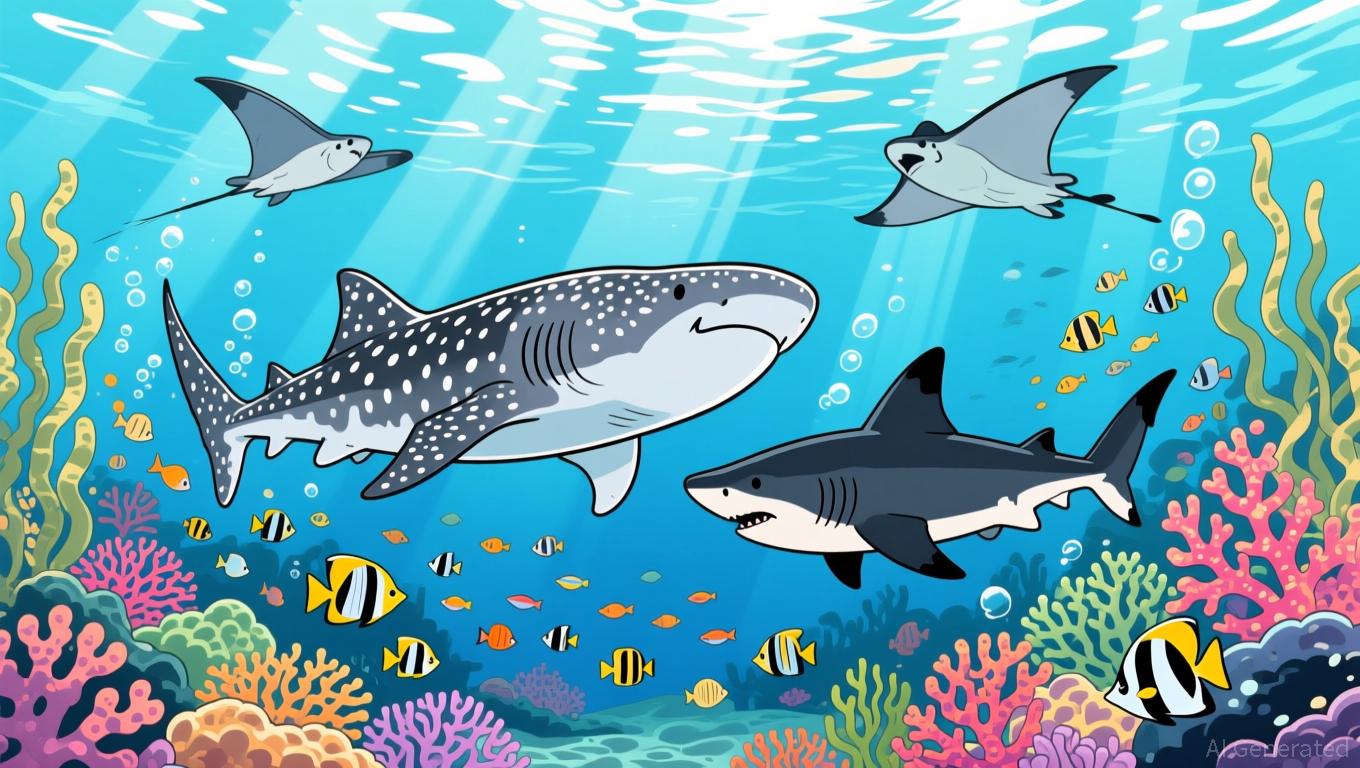CITES and Instant DNA Technology Aim to Uncover Covert Shark Trade and Prevent Species Disappearance
- CITES CoP20 in Uzbekistan proposes historic protections for 12 shark/ray species via Appendix I listings and stricter Appendix II monitoring. - Genetic testing reveals illegal shark trade volumes exceed official records by 10-70x, with Hong Kong as a key trafficking hub despite zero-export claims. - Portable DNA tools now enable real-time identification of 38 CITES-listed species, aiding enforcement in Indonesia, Ecuador, and other source countries. - Experts stress CITES is critical to prevent extinctio
At the 20th Conference of the Parties to the Convention on International Trade in Endangered Species (CITES CoP20), held in Samarkand, Uzbekistan, government representatives are at a crucial crossroads to prevent the disappearance of whale sharks, manta rays, and other highly threatened marine animals. Currently, more than 37% of shark and ray species are at risk of extinction, with pelagic shark numbers having dropped by over 70% in the past five decades and

The measures being discussed at CoP20—with backing from over 50 nations—would provide the most extensive protections for sharks and rays ever seen under CITES. These proposals include moving the oceanic whitetip shark, all manta and devil rays, and whale sharks to Appendix I, effectively banning international commercial trade. Zero export quotas are suggested for wedgefish and giant guitarfish, while species such as gulper sharks and smoothhound sharks would be added to Appendix II, requiring tighter oversight
The need for immediate action is highlighted by a recent Science Advances study, which discovered that fins from species listed under CITES, such as oceanic whitetip and hammerhead sharks, are found in markets at rates 10 to 70 times higher than what is officially reported. For instance, 81% of countries exporting shark fins claimed no exports of threatened species, even though DNA evidence traced the fins back to their waters. Hong Kong continues to be a major trade center, with many source countries failing to report the quantities uncovered by genetic testing.
To address this, marine biologist Diego Cardeñosa from Florida International University has created a portable DNA testing device that can instantly identify protected shark and ray species. The tool, tested on 55 species—including 38 listed by CITES—can detect unknown species and provide immediate proof for authorities. Cardeñosa points out that without fast identification methods, illegal shipments often go unnoticed, weakening global conservation efforts. The technology, which can also be used for turtles and mammals, is now being used in countries such as Indonesia and Ecuador to help stop trafficking.
Luke Warwick, who leads the Wildlife Conservation Society's (WCS) shark and ray initiative, emphasized that "CITES remains the most powerful international mechanism to ensure that wildlife trade does not push species to extinction." Dr. Susan Lieberman of WCS further noted that the proposed listings "align CITES with other international commitments and clearly demonstrate the global intent to safeguard these species before it is too late"
The outcomes of CoP20 may decide the fate of these vital species. As top predators and key ecosystem engineers, sharks and rays are essential for maintaining marine biodiversity and the stability of fisheries.
Disclaimer: The content of this article solely reflects the author's opinion and does not represent the platform in any capacity. This article is not intended to serve as a reference for making investment decisions.
You may also like
Bitcoin News Update: Removal from Index May Undermine MSTR’s Bitcoin-Based Strategy
- JPMorgan warns MSTR faces $8.8B in forced selling if MSCI excludes it from indices due to 50%+ digital asset threshold. - MSTR's stock dropped 67% since November 2024 peak as its valuation increasingly aligns with Bitcoin holdings (mNAV ~1.1). - CEO Saylor defends MSTR as "Bitcoin-backed enterprise," but critics argue its financial model lacks sustainability outside benchmarks. - Retail backlash against JPMorgan intensified, with figures like Grant Cardone closing accounts amid short-selling allegations.

Bitcoin News Update: MSTR's Business Role Under Scrutiny as MSCI Considers $8.8B Removal
- MSCI's proposed exclusion of MicroStrategy from global indices could trigger up to $8.8B in outflows due to its 50%+ bitcoin asset allocation. - JPMorgan warns the removal would damage MSTR's liquidity and capital-raising ability, with shares down 67% since November 2024. - CEO Michael Saylor defends MSTR's operational identity, rejecting "passive bitcoin fund" claims while adding $835M in crypto holdings. - MSCI's Jan. 15 decision could disrupt index-linked investor exposure to bitcoin, with MSTR shares

Bitcoin News Update: Institutions Acquire Crypto Shares Amid Rising Bearish Bets on Bitcoin
- Bitcoin's $80,000 put options dominate trading with $2B open interest, signaling sharp bearish reversal after its worst monthly drop since 2022. - ETF outflows accelerated declines, with $3.8B November redemptions, while Ark Invest added $38.7M in crypto equities amid market fragmentation. - Analysts warn leveraged losses ($19B in October) and forced liquidations amplify downturn, with Citi noting critical support at $80,000. - Market remains divided: Binance calls pullback "healthy," while Peter Brandt

Hyperliquid News Today: Speculation Drives Meme Coin Rally Despite Regulatory Alerts
- Meme coins surged on Nov 24, 2025, with PIPPIN rising 80% in 2 hours to $0.053 and $53.15M market cap. - BANANA (+20%) and TNSR (+50%) joined the frenzy, reflecting speculative flows shifting to high-risk assets amid Bitcoin stabilization. - Perpetual DEX protocols hit $4.24M daily revenue while Fed rate-cut expectations and token unlocks fueled volatility. - Regulators warned of risks as India exposed an AI-generated deepfake fraud, highlighting sector instability and regulatory scrutiny. - Analysts cau
